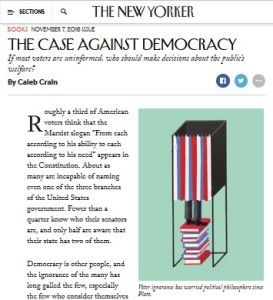Join getAbstract to access the summary!

Join getAbstract to access the summary!
Caleb Crain
The Case Against Democracy
If most voters are uninformed, who should make decisions about the public’s welfare?
The New Yorker, 2016
What's inside?
Should only the educated vote?
Recommendation
If Americans don’t know what’s in their Constitution, how can they pick leaders who will uphold its principles? Since the days of Plato in ancient Greece, intellectuals have fretted about ignorant voters and argued for a system run by educated people instead. Political scientist Jason Brennan is one such intellectual. Literary critic and journalist Caleb Crain dissects Brennan’s new book Against Democracy, offering historical insights and a fresh voice. While always politically neutral, getAbstract recommends Crain’s sharp analysis, which doesn’t lose faith in democracy.
Summary
About the Author
Caleb Crain is a literary critic, journalist and author of the award-winning novel Necessary Errors.
















Comment on this summary